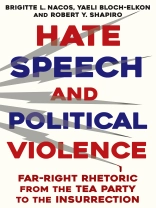How did the United States descend into crisis, with institutions frayed, political violence mounting, and democracy itself in peril? This timely book identifies how the Tea Party and its extremist narratives laid the groundwork for the rise of Donald Trump, his MAGA movement, and the January 6, 2021, assault on the Capitol.
Brigitte L. Nacos, Yaeli Bloch-Elkon, and Robert Y. Shapiro trace the escalation of a strain of extremist rhetoric in right-wing political discourse after the inauguration of Barack Obama. Drawing on extensive and in-depth analysis of political communication in both traditional media and online spaces, they demonstrate how the dominant rhetorical styles of the Trump era were pioneered by the Tea Party. A backlash to the election of the first Black president, this reactionary social movement deployed violent language and spread anti-Obama paranoia, with the assistance of media insiders, GOP leaders, and conservative advocacy groups. Donald Trump rose to political prominence by hitching himself to the “birther” racist conspiracy theory, espoused by many Tea Partiers, and drew from their aggressive and hyperpartisan repertoire. Ultimately, this book shows, the increasingly violent rhetoric of right-wing extremists spilled over into real-world political violence. Revealing the path the Tea Party blazed to Trump and the insurrectionists, Hate Speech and Political Violence provides timely new insights into the threats facing American democracy.
İçerik tablosu
Preface
1. Introduction: From the Tea Party and Donald Trump’s MAGA Extremism to January 2021
2. The Tea Party Movement, the Mass Media, and Contentious Politics
3. Online and Offline Media as Super Spreaders of Anti-Obama Conspiracy Theories
4. Donald Trump’s Incendiary Rhetoric and Political Violence
5. Partisan Conflict, Issues, and Emotions on High
6. Weaponized Words and Deeds Against Democracy
Postscript
Abbreviations
Appendix
Notes
Index
Yazar hakkında
Brigitte L. Nacos is a political scientist who taught for three decades at Columbia University and the author of several books on terrorism and counterterrorism. She is also a journalist who worked for many years as U.S. correspondent for newspapers in Germany.Yaeli Bloch-Elkon is a senior lecturer/associate professor of communications and political science and head of the International Communication program at Bar Ilan University, as well as an associate research scholar at Columbia University’s Institute for Social and Economic Research and Policy.Robert Y. Shapiro is the Wallace S. Sayre Professor of Government in the Department of Political Science and the School of International and Public Affairs at Columbia University. The author of many books and academic articles, he received the 2022 Award for Exceptionally Distinguished Achievement from the American Association for Public Opinion Research.Nacos, Bloch-Elkon, and Shapiro previously coauthored Selling Fear: Counterterrorism, the Media, and Public Opinion (2011).












